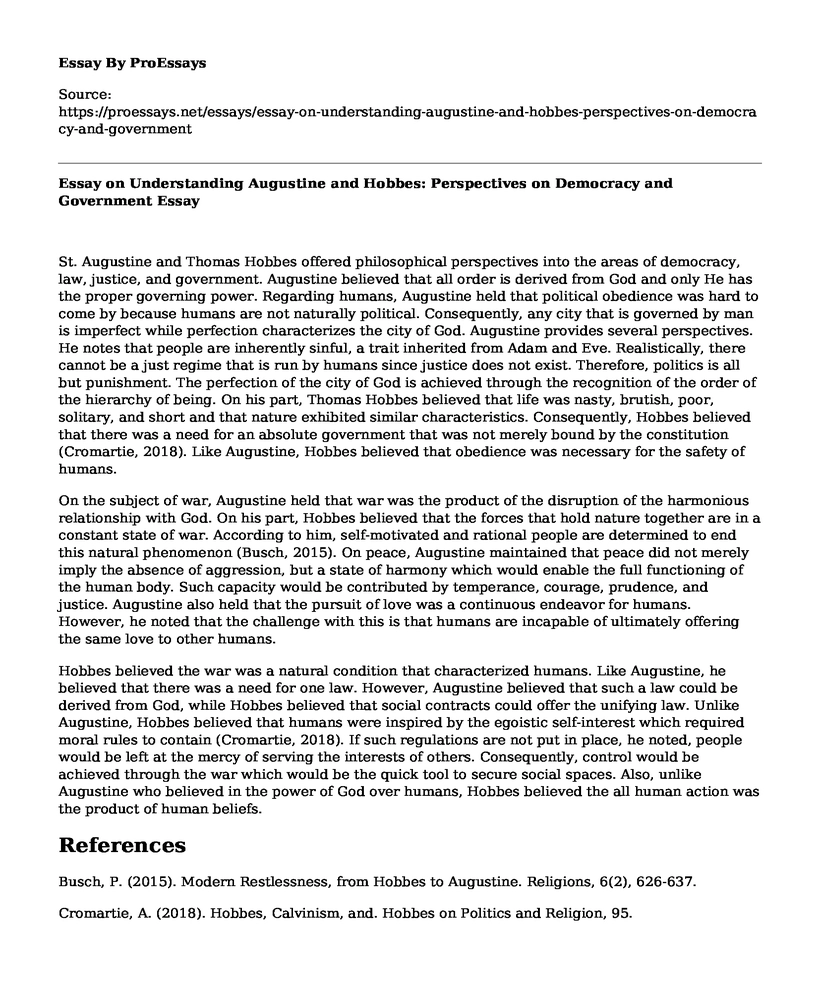St. Augustine and Thomas Hobbes offered philosophical perspectives into the areas of democracy, law, justice, and government. Augustine believed that all order is derived from God and only He has the proper governing power. Regarding humans, Augustine held that political obedience was hard to come by because humans are not naturally political. Consequently, any city that is governed by man is imperfect while perfection characterizes the city of God. Augustine provides several perspectives. He notes that people are inherently sinful, a trait inherited from Adam and Eve. Realistically, there cannot be a just regime that is run by humans since justice does not exist. Therefore, politics is all but punishment. The perfection of the city of God is achieved through the recognition of the order of the hierarchy of being. On his part, Thomas Hobbes believed that life was nasty, brutish, poor, solitary, and short and that nature exhibited similar characteristics. Consequently, Hobbes believed that there was a need for an absolute government that was not merely bound by the constitution (Cromartie, 2018). Like Augustine, Hobbes believed that obedience was necessary for the safety of humans.
On the subject of war, Augustine held that war was the product of the disruption of the harmonious relationship with God. On his part, Hobbes believed that the forces that hold nature together are in a constant state of war. According to him, self-motivated and rational people are determined to end this natural phenomenon (Busch, 2015). On peace, Augustine maintained that peace did not merely imply the absence of aggression, but a state of harmony which would enable the full functioning of the human body. Such capacity would be contributed by temperance, courage, prudence, and justice. Augustine also held that the pursuit of love was a continuous endeavor for humans. However, he noted that the challenge with this is that humans are incapable of ultimately offering the same love to other humans.
Hobbes believed the war was a natural condition that characterized humans. Like Augustine, he believed that there was a need for one law. However, Augustine believed that such a law could be derived from God, while Hobbes believed that social contracts could offer the unifying law. Unlike Augustine, Hobbes believed that humans were inspired by the egoistic self-interest which required moral rules to contain (Cromartie, 2018). If such regulations are not put in place, he noted, people would be left at the mercy of serving the interests of others. Consequently, control would be achieved through the war which would be the quick tool to secure social spaces. Also, unlike Augustine who believed in the power of God over humans, Hobbes believed the all human action was the product of human beliefs.
References
Busch, P. (2015). Modern Restlessness, from Hobbes to Augustine. Religions, 6(2), 626-637.
Cromartie, A. (2018). Hobbes, Calvinism, and. Hobbes on Politics and Religion, 95.
Cite this page
Essay on Understanding Augustine and Hobbes: Perspectives on Democracy and Government. (2023, Jan 02). Retrieved from https://proessays.net/essays/essay-on-understanding-augustine-and-hobbes-perspectives-on-democracy-and-government
If you are the original author of this essay and no longer wish to have it published on the ProEssays website, please click below to request its removal:
- Compare and Contrast Mao Zedong and Kim Jong Un's Method of Enforcement
- Essay Sample on Cultural Validity
- Building the Wall - Essay Sample
- Essay on Governing Arrangements & Political Will: Key to US Urban Development
- NASA Investment: Essential for America's Superpower Status - Essay Sample
- Donald Trump's Stunning Victory: Exploiting Communication in the Information Age - Essay Sample
- Government Leadership and Crime: A Modern Scourge - Essay Sample







